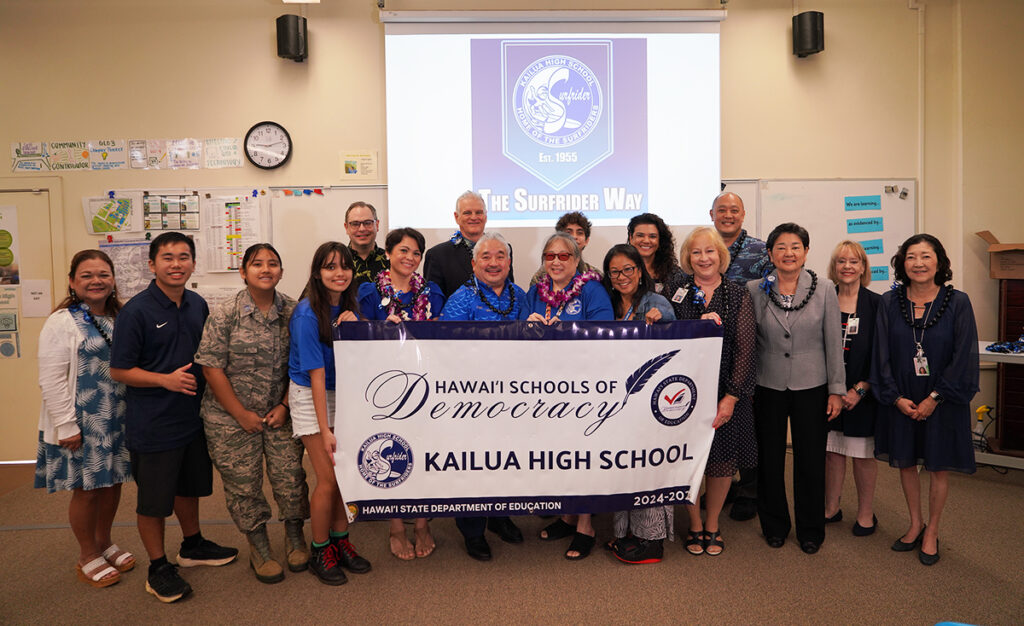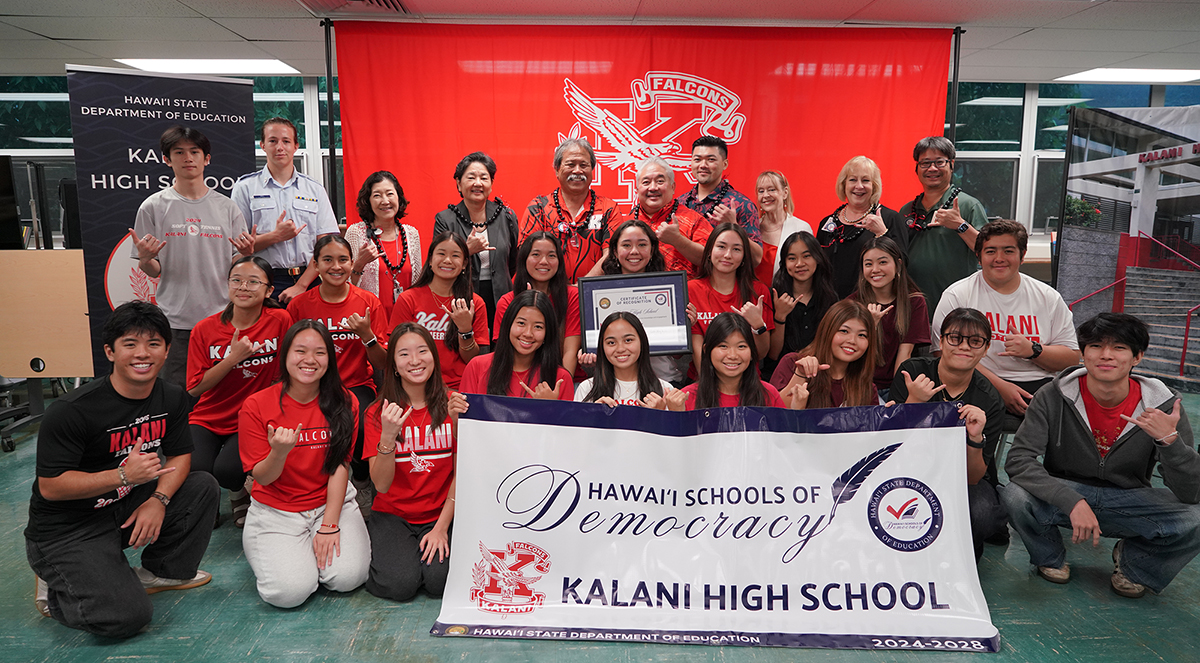The Hawai’i State Department of Education (HIDOE) announced the recognition of Kalani High and Kailua High as the newest Hawai’i Schools of Democracy (HISOD). These schools join a growing list of high schools that demonstrate dedication in preparing students to be active and informed participants in a democratic society.
“The designation of Kalani and Kailua High Schools as Hawai’i Schools of Democracy is a significant step forward in the Department’s commitment to providing a world-class education for every student,” Superintendent Keith Hayashi said. “Civic education is the cornerstone of a healthy democracy. These schools are creating learning environments where students explore complex issues, engage in respectful dialogue, and develop a deep understanding of their rights and responsibilities.”
Modeled after a national recognition program and tailored by the HIDOE for Hawaiʻis unique student landscape, Kalani and Kailua High Schools underwent a months-long process providing extensive evidence of its exemplary work in democratic learning and student engagement. A committee made up of HIDOE, the Commission to Promote and Advance Civic Education (PACE), and community experts, reviews school applications and only confirms schools that display a commitment to the key indicators of the HISOD program.
“Congratulations to both Kailua and Kalani High Schools on being recognized as Hawaiʻi Schools of Democracy,” Chief Justice Mark E. Recktenwald said. “Their commitment to fostering civic engagement by their students is critical to the future of our democracy. I want to thank the members of the PACE Commission, and in particular its Chair, Justice Lisa Ginoza, and Vice-Chair Representative Amy Perruso, as well as their many partners, including the University of Hawai‘i William S. Richardson School of Law, Hawaii State Bar Association, Hawaiʻi State Department of Education, Hawai‘i Association of Independent Schools, and the American Judicature Society, who have stepped up to promote civic education and engagement to people of all ages across our state.
“As a graduate of Kailua High School, I am thrilled that the school has made the commitment and achieved the designation as a Hawaiʻi School of Democracy,” said Lisa Ginoza, associate justice of the Hawai‘i Supreme Court. “Congratulations also to Kalani High, which also received the designation this year. It is vital that students and the larger community embrace the responsibility to engage and participate in our system of government. Further, by expanding civics education, I believe students, educators and others will experience the joy that comes from working together for the good of our community.”
Mililani and Maui High Schools were the first schools recognized in the program’s inaugural year. Next year, the program will engage intermediate/middle schools and pilot an elementary program to create a K-12 continuum.
PACE and the HIDOE also released the findings of a statewide survey on civic education in Hawaiʻi’s public and independent schools. In the report, From Classroom to Community: Advancing Civics Education in Hawaiʻi, nearly 800 educators (627 teachers who reported having responsibility for social studies or civics education and 168 administrators) participated. The findings offer an unparalleled look at the current state of civics education in Hawai‘i’s school systems. The survey results validate key recommendations from the Civics Learning Engagement Task Force, a diverse group of educators, community leaders, and stakeholders convened by the HIDOE in Spring 2024.
“This survey confirms what many educators have long known. Civics education is essential, but it often struggles to compete with other priorities,” said Colin Moore, PACE Commissioner and political scientist at UH-Manoa. “Teachers are committed to preparing students for civic life, but they need better resources, more time, and stronger institutional support. By addressing these challenges, we can ensure that every student in Hawai‘i has the knowledge and skills to actively engage in their communities and our democracy.”
Heidi Armstrong, deputy superintendent of academics, added, “We celebrate the progress detailed in this first-ever civic education report and also PACE, who are strong partners in helping us achieve our goal to prepare students for civic duty. This report will assist us in making informed decisions on investments, such as resources and professional development, so we may amplify our reach to foster the next generation of globally responsible citizens.”

Highlights from the report include:
Strong Teacher Commitment to Civics: 48% of teachers consider civics a high or essential priority in their classrooms, but only 32% believe it receives similar attention school-wide, indicating a gap between classroom-level instruction and broader institutional priorities.
Widespread Need for High-Quality Instructional Resources for Civics: Nearly half of all teachers (45%) stated that the civics instructional resources available to them were inadequate, with the problem most acute in grades K-5. This points to a clear area for investment, especially given the critical role elementary teachers play in building the foundation of civic understanding at an early age.
Balancing Civics with Other Curriculum Demands: 56% of teachers cite pressure to cover other subjects as a barrier to civics instruction. 59% of administrators agree that limited time in the curriculum is the biggest obstacle to expanding civics education, highlighting the need for creative solutions to integrate civic learning.
Expanding Professional Development to Meet Educator Demand: There is broad agreement among educators that the most pressing priority for professional development is improving the pedagogy of civics education, including best practices for fostering student engagement. Three-quarters of administrators and 71% of teachers identified this as the most important area for professional learning.
Spotlight on exemplary HIDOE civics programs:
The report reaffirms HIDOE’s commitment to ensuring all students have access to a robust civics education. Several programs that embody the department’s vision for civic education are:
Hawai‘i State Student Council: The Hawai‘i State Student Council serves as a platform for students to voice their concerns, deliberate on critical issues, and present their perspectives to the Hawai‘i State Legislature and the Board of Education. These efforts ensure students are directly involved in shaping policies that affect their education and communities.
Keiki Caucus High School Legislative Internship Program: This partnership between HIDOE and the Hawai‘i State Legislature provides high school students with a unique opportunity to gain hands-on experience in the legislative process. Through a rigorous curriculum and shadowing state lawmakers, participants learn firsthand about policymaking and the importance of civic participation.
Hawai‘i Schools of Democracy: Launched in 2023, the newest civics program recognizes high schools that demonstrate a strong commitment to preparing students for civic life, higher education, and career success. Schools earn this distinction by offering diverse learning opportunities that emphasize identity, student agency, and real-world experiences.
These programs showcase HIDOE’s ongoing efforts to educate students in the civic process and engage teachers in pedagogical training.
The civics report, through an unprecedented statewide survey, reveals highlights and areas where the Department can focus on innovations in the civics programs. The report also affirms the vital role civics education plays in shaping the next generation of leaders and citizens which is essential for a thriving democracy. The Department remains steadfast in its conviction to sustain civics education at its highest levels. The full report on the civic education survey results, including recommendations for future initiatives, is now available for review by clicking on the images below or visiting www.civicshawaii.org/resources.

